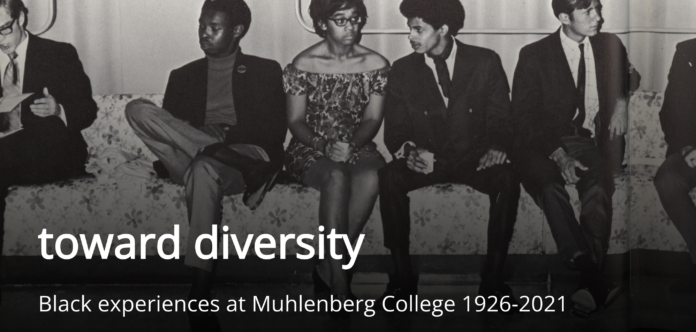History was made last week as a new page was added to The Muhlenberg Memories Project website pertaining to diversity. The Muhlenberg Memories Project is a collection of pages covering a wide variety of topics, including the history of buildings on-campus to the Allentown Band. Each page features a collection of videos, images and text to serve as an archive and share the history of the College. The “toward diversity” tab is the website’s newest addition that shares the experiences of Black people here on campus over the span of nearly a century.
The website was put together by Susan Falciani Maldonado, special collections & archives librarian at Trexler Library, Kate Ranieri, Ph.D., assistant professor in the media & communication department, Anthony Dalton, digital cultures technologist, Samantha Brenner ‘21 and Hailey Petrus ‘23, Black Students Association president. The event was hosted by Emanuela Kucik, Ph.D., assistant professor of the English and Africana studies departments, and Roberta Meek, lecturer in the media & communication department.
The unveiling of the page was celebrated on Feb. 15 through a Zoom call with over 80 participants, including multiple Black alumni from the 1970s who provided oral histories and pictures for the website.
“I think we were all very, very pleased with how the launch event went,” shared Falciani Maldonado. “One of our primary goals was to bring the alumni from the 1970s into communication with our current students and other current community members, and I think they truly enjoyed the experience. The event was enhanced by how many of their fellow alumni from the decade attended as guests. I think that increased the connection they felt to the College during this event.”
“For being a Zoom event, it was one of the most exuberant, especially because so many shared their thoughts and experiences so graciously.”
Kate Ranieri
The oral histories were a new addition to the website that brought a direct and personal way to share the experiences of the Black alumni.
Ranieri explained, “I’m deeply honored to be able to work with students, teaching them the theory and practice of capturing oral history. The oral histories we have acquired provide such more depth and understanding to our understanding of Black students’ experiences in the 60s and 70s.”
The Zoom call consisted of an introduction to the new “toward diversity” page followed by a description of the overall goal of the new project and the process of creating the archive.
“I hope that the site will provide a starting point for current and future Black students to get ‘caught up’ on the work and experiences that have come before,” said Falciani Maldonado. “That they can see that they and their work are part of a continuum of activism and change. I hope it will be helpful for them to incorporate knowledge of initiatives and tactics of the past into their efforts to change the present and future. And the same goes for college administration. The nature of a college is that the student body turns over every four years, and administration and staff move in and out through the decades. I hope that the site will help provide an overview that helps inform future change.”
Dalton shared, “There are so many stories to be explored. Even more to be unearthed. The more stories we have—the more lived experiences we capture—the more we can learn from that experience. In our research, we found so many stops and starts, so many do-overs and a smattering of blunders, and I can’t help but feel that if good, experiential history was documented and shared openly, some of these setbacks would never have happened. That maybe the College could have done better. We’re doing much better now than ever before, and now we have even a partial, collected history that shows that, but there’s plenty of room to grow.”
With hopes to bring about more conversation regarding diversity and inclusion, the website celebrated accomplishments such as the Educational Opportunity Pilot Program, a program to enroll more Black students on campus, and its creation of the Africana studies minor and the Office of Multicultural Life. The alumni shared a heartwarming reunion on Zoom with some of them being close friends from almost 50 years ago. The “toward diversity” addition to the website has proved to be a push in the right direction towards a diverse campus that has a strong understanding of the campus’ history.
Petrus shared, “The voice of the alumni and being able to clearly understand their experience was extremely important to my research and there couldn’t be a better way to show that than through their lens. This website will help push for diversity on campus in the coming future because I believe seeing it has raised more awareness and curiosity across campus. A lot more students are interested in being a part of this project and researching even more aspects of the campus.”
“All too often we’re left with historical facts. But that’s not what our work—this project—is all about. Oral histories, the project the Muhlenberg Memories Project as a whole is all about rehumanizing history.”
Anthony Dalton
Matthew '25 is a double major in Biology and French. When he's not in class or writing for the paper, he is usually swimming, skiing, playing volleyball, lifeguarding, or listening to music!























